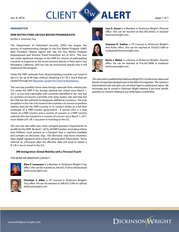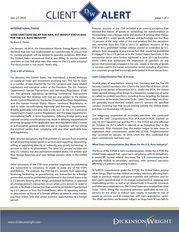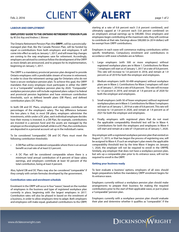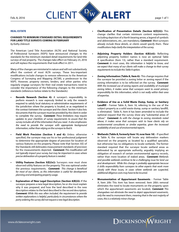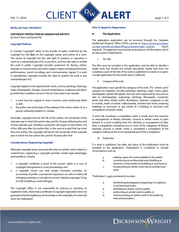The Auto Industry’s Safety Whistleblower Program: What You Need To Know - April 2016
Dickinson Wright
Description
March 19, 2016
CLIENT
Wasn’t this already part of the Moving Ahead for Progress in the
21st Century Act of 2012 (MAP-21 Act)?
It’s similar. The MAP-21 Act made it illegal for an auto company,
supplier or dealer to discriminate against or take adverse employment
action against an employee who reports or is about to report a defect,
noncompliance or any violation of a motor vehicle defect reporting
obligation. It allows for complaints to be filed with the Secretary
of Labor, who is charged with investigating the complaint and
adjudicating the dispute. The secretary can order the employee to be
reinstated or award damages and attorney fees to the complainant.
The FAST Act builds on this by also awarding any whistleblower 10 to
30 percent of any resulting settlements, fines or civil penalties.
Will this increase the number of defect investigations against auto
companies?
If the SEC Whistleblower Program is any indication, this will almost
certainly lead to more enforcement actions eventually, but not at first.
In 2012, the program’s first full year, the SEC received 3,001 tips.
This number has gradually increased by around 300 more tips each year since, culminating 3,923 tips during 2015. But it wasn’t just the volume of tips that has increased enforcement as much as the quality. As the program has aged, tipsters have hired attorneys to help them collect the appropriate data to report, thus increasing the likelihood of receiving an award. From all of the 14,116 tips received during the life of the program, the SEC has paid out $54 million to just 22 whistleblowers.
But, $37 million of that was paid out in 2015 alone. So is there anything we can do? Yes, there is! Congress built exceptions into the MVSWP that deny a reward to otherwise qualifying whistleblowers in certain circumstances, such as criminal activity by the whistleblower, or if he deliberately caused or substantially contributed to the violation. One of those exceptions provides auto companies with a way to ensure its employees will not qualify for a reward: By creating an internal reporting mechanism to protect employees from retaliation. Having such an internal reporting mechanism would force the whistleblower to meet another qualifying element (He must have a reasonable belief he would have been retaliated against anyway, have a reasonable belief that the information was already internally reported, investigated or otherwise made known to the company, or “if the Secretary has good cause waive this requirement.”) If you already established a policy and a procedure to encourage the reporting of potential violations and to protect whistleblowers from retaliation, as major suppliers and OEMs have, you should be all set. If not, such policies and procedures should be established quickly. ALERT page 2 of 2 This client alert is published by Dickinson Wright PLLC to inform our clients and friends of important developments in the field of automotive law.
The content is informational only and does not constitute legal or professional advice. We encourage you to consult a Dickinson Wright attorney if you have specific questions or concerns relating to any of the topics covered in here. FOR MORE INFORMATION CONTACT: John E. Anderson Sr.
is a member attorney with the Nashville office of Dickinson Wright PLLC. His practice focuses on commercial and business litigation. Reach him at janderson@dickinsonwright.com. Richard A.
Wilhelm is of counsel with the Detroit office of Dickinson Wright PLLC. His practice focuses on automotive and product litigation & regulation. Reach him at rwilhelm@dickinsonwright.com. .
This number has gradually increased by around 300 more tips each year since, culminating 3,923 tips during 2015. But it wasn’t just the volume of tips that has increased enforcement as much as the quality. As the program has aged, tipsters have hired attorneys to help them collect the appropriate data to report, thus increasing the likelihood of receiving an award. From all of the 14,116 tips received during the life of the program, the SEC has paid out $54 million to just 22 whistleblowers.
But, $37 million of that was paid out in 2015 alone. So is there anything we can do? Yes, there is! Congress built exceptions into the MVSWP that deny a reward to otherwise qualifying whistleblowers in certain circumstances, such as criminal activity by the whistleblower, or if he deliberately caused or substantially contributed to the violation. One of those exceptions provides auto companies with a way to ensure its employees will not qualify for a reward: By creating an internal reporting mechanism to protect employees from retaliation. Having such an internal reporting mechanism would force the whistleblower to meet another qualifying element (He must have a reasonable belief he would have been retaliated against anyway, have a reasonable belief that the information was already internally reported, investigated or otherwise made known to the company, or “if the Secretary has good cause waive this requirement.”) If you already established a policy and a procedure to encourage the reporting of potential violations and to protect whistleblowers from retaliation, as major suppliers and OEMs have, you should be all set. If not, such policies and procedures should be established quickly. ALERT page 2 of 2 This client alert is published by Dickinson Wright PLLC to inform our clients and friends of important developments in the field of automotive law.
The content is informational only and does not constitute legal or professional advice. We encourage you to consult a Dickinson Wright attorney if you have specific questions or concerns relating to any of the topics covered in here. FOR MORE INFORMATION CONTACT: John E. Anderson Sr.
is a member attorney with the Nashville office of Dickinson Wright PLLC. His practice focuses on commercial and business litigation. Reach him at janderson@dickinsonwright.com. Richard A.
Wilhelm is of counsel with the Detroit office of Dickinson Wright PLLC. His practice focuses on automotive and product litigation & regulation. Reach him at rwilhelm@dickinsonwright.com. .

